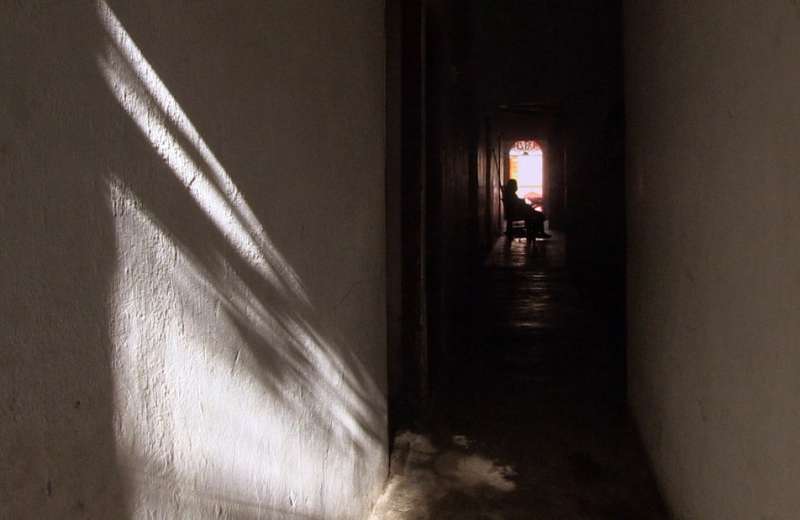Mama Isha: An intimate and deep film about the uprooting of those who left and their desire to return

It is currently on the national bulletin board, including Armenia, the documentary Mama Icha’s house. A Colombian production that can be enjoyed in cinemas in the shopping center Quindio portal.
This work tells a story Maria Dionysia Navarro, Known as Mama Icha, who is 93 years old and has lived for a long time outside her home country mombox He has only one last wish to be able to come back and enjoy looking again at the beloved and unforgettable Magdalena River as evening falls.
She wants to go back to her hometown and enjoy the house she built with the money she earned and ran out of the country.
On this return trip, the viewer will be able to immerse themselves in an intimate story that is accurately told through the lens and under supervision Oscar Molina, That he took time to build and discovered little by little the gist of what he wanted to say and let it be reflected as testimony.
The film shows us that uprooting is clear in a country like Colombia, Where the search for new horizons and opportunities for advancement is a social and economic phenomenon that leaves behind a whole series of irreparable consequences, of which little is said and much less in cinema.
Mama Icha’s house will also be broadcast United State by the public channel PBS, which selected him for its documentary featuring 14 films each year from among more than 800 submissions from around the world.
It should be noted that this production has participated in many important international film competitions, including the official selection for the 2021 American documentary season for PBS public television in the United States, and it was also an official selection and an honorable mention in the United States. Latin Film Festival Philadelphia, US 2021 and the official selection of the Cartagena International Film Festival 2020, among others.
Here is what his director told us about his movie:
What is the starting point for La casa de Mama Icha?
The point is a question about how the economy changes the experience of the home: Why are the residents of a country rich in natural resources and cultural diversity forced to seek economic prosperity in other countries? This quest for prosperity leads both Colombian immigrants and their relatives in Colombia to depend on resources obtained during emigration, making it difficult for citizens to return to the country.
For Colombia, this displacement of its population abroad generates foreign exchange income commensurate with the country’s economy and direct support to immigrant families. In 2020, Colombian immigrants sent to the country more than 6.9 billion dollars, nearly three times the sales of coffee and nearly half of the sales of energy resources abroad.
Oscar, are you also an immigrant?
More like an explorer. In 1997, after I finished my studies in journalism and needed a little perspective on working conditions, the social fabric, and political system of my country, I began to live periods abroad, especially in Japan and the United States.
What prompted you to start this research?
First, you grew up in a country with endless conflict and one of the highest rates of displaced people in the world. Ever since I was a kid, I’ve wondered why Colombia, despite its rich natural and cultural resources, could not be home to all of its inhabitants. The other thing is that during my travels I worked side by side with immigrants from other countries, who dreamed of building dream homes in their countries of origin.
What influenced you the most in these stories?
Most of the stories I know started out the same way: Citizens of less economically developed countries come to more developed countries with the idea of saving money and making sacrifices to achieve their economic goals. They send money home every month, and many stories coincide in allocating that money to building or buying a home that would welcome them back when they returned. These homes can lie empty for years, oversized containers dream of making a comeback, and a visual testament to their illusory economic viability.
Has the issue of immigrants been analyzed from several points of view… Why did you decide to share your point of view as well?
While immigration is often a topic of political conversation and research stories are told about the legal and living conditions faced by different immigrant groups in host countries, I have been concerned about the less discussed emotional legacies: What do family ghosts continue to haunt the traveler? What roots bloom and what roots penetrate miles? What dreams are put into practice in the country of origin, broken by the years of separation? What are the personal and family consequences of economic exile?
Did all this manage to translate into Mama Icha’s house?
Mama Icha’s story is a powerful journey within this global phenomenon. The film aims to reveal the forces of tradition and attachment in the context of displacement and social and economic inequality. Invite the public to reflect on the need for the globalization of social rights in an age when capital moves freely across borders.
How is this combo?
The film traces Mama Icha in chronological order, during each step of this journey: her decision to leave Philadelphia against her family’s wishes, her arrival in Mombox, the inner conflict between her children, and her final decision about home and her children. consequences. The story unfolds through the characteristic elements of the classic narrative: a central character, deeply captivating, who sets out to pursue a goal and faces internal and external conflicts, and morally ambivalent secondary characters. During two and a half years of close observation, the film invites us to delve into Icha’s emotional experience as her dreams meet her reality.
After this movie, a full transmedia documentary trilogy is planned to continue talking about the topic…
Our goal is to continue to participate and seek to generate discussion on the various core issues that exist in this phenomenon. On the one hand, there is the feature film House of Absentees, and more ambitiously through a web tool that places the stories of immigrants and their conversion homes in different parts of the world, among the greatest forces of global resource exchange and migration. .
tractor:

“Professional problem solver. Subtly charming bacon buff. Gamer. Avid alcohol nerd. Music trailblazer.”




:quality(75)/cloudfront-us-east-1.images.arcpublishing.com/elcomercio/6NEH6FMKYBCU7JJWZ5GVRZKTRM.jpg)
/thumbs.vodgc.net/1-14-FnXFWZ1684253239488_1080P.jpg)





